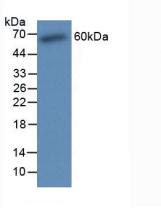
Details
ACTIVITY TEST
Buffer Formulation 20mM Tris, 150mM NaCl, pH8.0, containing 1mM EDTA, 1mM DTT, 0.01% SKL, 5% Trehalose and Proclin300. Traits Freeze-dried powder Purity > 95% Isoelectric Point 4.3 Applications Cell culture; Activity Assays.


Osteopontin (OPN), a multifunctional phosphorylated glycoprotein, plays an important role in neutrophil recruitment and was found to induce the expression of proinflammatory chemokines including MCP-1 and MIP-1β which promote migration and recruitment of inflammatory cells. It has been reported that OPN induces MCP-1 expression through the NF-kappaB pathways in MCF-7 breast cancer cell line. To test the bioactivity of recombinant rat OPN, MCF-7 cells were seeded into 24-well plate at a density of 1x105 cells/mL , and allowed to attach overnight before treated with certain concentrations of recombinant rat OPN for 48h and MCP-1 levels in the cell supernatant were determined by ELISA (SEA087Hu). MCP-1 levels in the cell supernatant of MCF-7 cells increased significantly after stimulated with OPN which was shown in Figure1, the EC50 was 9.83 ug/ml.
USAGE
Reconstitute in 20mM Tris, 150mM NaCl (PH8.0) to a concentration of 0.1-1.0 mg/mL. Do not vortex.
STORAGE
Avoid repeated freeze/thaw cycles. Store at 2-8°C for one month. Aliquot and store at -80°C for 12 months.
STABILITY
The thermal stability is described by the loss rate. The loss rate was determined by accelerated thermal degradation test, that is, incubate the protein at 37°C for 48h, and no obvious degradation and precipitation were observed. The loss rate is less than 5% within the expiration date under appropriate storage condition.
Image

SDS-PAGE Image

Figure. Western Blot; Sample: Recombinant OPN, Rat.
Partial purchase records(bought amounts latest0)
User Comment(Total0User Comment Num)
- No comment


 +86 571 56623320
+86 571 56623320




